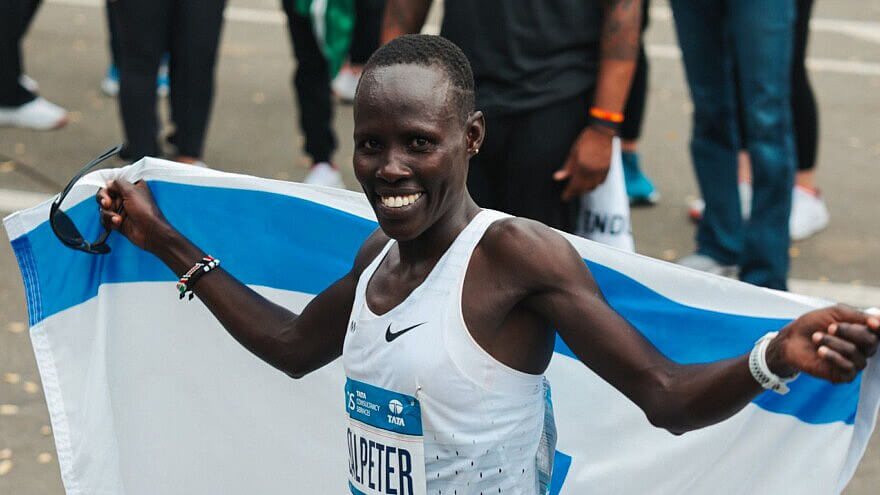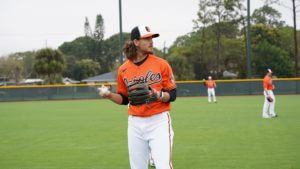Original Article published On the Jewish Times
Tamir Goodman, who started his illustrious basketball career at Talmudical Academy (TA) in Baltimore, returned to the city of his youth earlier this month to share his love of basketball and his dedication to bringing together people of different backgrounds. The Unity Clinic at the Weinberg Park Heights JCC provided an opportunity for local Black and Jewish basketball players, in addition to several sports world celebrities, to come together to learn and play basketball and to begin forming meaningful relationships.
“It was so magical to be back,” reports Goodman, 40, who spent his high school years in Baltimore before transferring to Takoma Academy Preparatory School (TA Prep), a Seventh-Day Adventist School in Takoma Park, Md., so he could remain Sabbath-observant and still play competitive basketball. “It was a slam dunk! They established positive relationships,” says Goodman, who was pleased with every aspect of the day.
“It was a great workout; leading coaches led their favorite drills; and they had doughnuts and drinks together at a meet and greet afterwards,” he describes. “At the end, they exchanged game schedules, and coaches and players will come out to games and support each other.”
Goodman does not take their forming relationships for granted: “They arrived not knowing each other and possibly never knowing each other, meeting each other. and they left as friends. That is how we better the world through basketball. I am just so thankful that it went so well.”
Participants in the clinic play at what Goodman describes as “two basketball powerhouses — Mervo and Baltimore City College (high school).” They joined players from Yeshivat Mekor Chaim, a local yeshivah coached by Goodman’s former coach and lifelong friend, Coach Haim Katz. “I met Coach Katz at age 7 or 8,” Goodman says affectionately. “I am 40 now. We talk one or two times every day!”
Katz reports that Goodman has “worked his whole adult life to bring peace to people. He does not see colors or religions, he just sees people — creations of God — and it bothers him. He thinks that each person is created in God’s image and is holy.”
He notes that “basketball is his life, and he sees the great things that can come out of it — it can be used as a metaphor and vehicle to bring peace, joy and understanding to people.”
Goodman playfully adds, “I was a Jewish kid who went to a Catholic school for high school and roomed with a Muslim player in college.”
Celebrities at the Unity Clinic included former Baltimore Ravens running-back Matthew Lawrence; former professional basketball player and NBA coach Corsley Edward; former Portland Trailblazers player Ronnie Murphy; and Joanne Pasternack, who formerly headed the philanthropy, and community relations and outreach functions at the San Francisco 49ers and the Golden State Warriors.

‘A storied place in my heart’
While in town, Goodman also addressed an Israel Bonds business networking event and the Weiner Family Basketball Tournament at the Beth Tfiloh Dagan Community School. The tournament has been bringing Jewish teens from around the United States, Canada and Israel together for basketball, Shabbat observance and comraderie since 1988.
Goodman’s illustrious and evolving basketball career started during his own high school career where he averaged 35 points per game in the 11th grade at TA and was ranked 25th best high school player in the country. He remained committed to Orthodox religious practice even as he pursued his basketball dreams. Playing at a Seventh-Day Adventist school, where Saturdays are observed as the day of rest, afforded an opportunity to play high-level basketball for the remainder of his high school career.
Goodman initially received a scholarship to play basketball at the University of Maryland, but he ultimately declined the offer given difficulties accommodating his Sabbath observance. He then accepted a scholarship from Baltimore’s Towson University in 2000. He averaged 6 points, 4 assists and 2.5 rebounds per game in his first year, and was awarded the coach’s award for his performance on the court and in the classroom. He continued at Towson for his sophomore year, ultimately leaving when the basketball program underwent significant changes.
His very public high school and college career were covered extensively by such publications and media outlets as Sports Illustrated, “60 Minutes,” ESPN, CNN, Fox, The New York Times and The Washington Post. Comedian Jerry Seinfeld even performed a skit about “The Jewish Jordan.”
Goodman went on to play professional basketball in Israel. He signed a three-year contract with Maccabi Tel Aviv in 2002 and played with several teams in Israel over the course of his career. In 2004, he served in the Israel Defense Forces, where he was awarded “Most Outstanding Soldier” and also suffered a knee injury. After a seven-year career playing basketball in Israel — and several other serious injuries — Goodman retired from professional basketball in 2009.
Goodman has continued to be actively involved in all aspects of the basketball world. He runs a summer overnight basketball camp in Jerusalem for players from around the world. His clinics also brings Arab and Jewish children together. “My culture diversity camps unite people and they form relationships through basketball,” he says.

In 2013, Goodman shared his story in the book “The Jewish Jordan’s Triple Threat.” He is also an accomplished entrepreneur and business consultant. He founded Zone190, a training device being used in the NBA; as well as Sport Strings Tzitzit, compression-fit, moisture-wicking ritual fringes; and Aviv Net, a basketball net that dries and sanitizes basketballs as they pass through the basketball net. Goodman works in business development with the Hapoel Jerusalem Basketball Club and is working to develop a system for “on net advertising,” which he reports is “soon to premier in its first indoor pro game and will hopefully get to all leagues around the world.”
In addition, the tireless Goodman is working with Fabric, an Israeli sport tech and sports engagement firm that brings people together through an innovative technology platform. Fabric served as a sponsor for the Unity Clinic.
Goodman lives in Jerusalem with his wife and five kids, and brought one of his daughters with him on his recent Baltimore trip. “I’ve been in Israel for 20 years,” he says. “But Baltimore always has a storied place in my heart. It will always be extra-special to me.”




